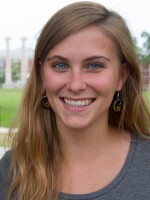The deaf community has its own language, culture and set of obstacles, and most hearing people will never interact with it. But Dr. Stephanie Logan was thrust into the deaf community when she lost her hearing at the age of 23.
Logan was studying psychology at the University of Georgia when she contracted spinal meningitis. In less than a week, her hearing was completely gone.
"I had never met a deaf person and I had never seen sign language before in my life,” Logan said. "I didn't know what would happen. I literally had to start all over with communication."
Unable to hear or speak, she had to put her graduation on hold. She ended up stayed in the hospital for a month. And when she was released, her only education option was Gallaudet University, the sole university for the deaf in the US. It was here that Logan learned sign language and re-learned how to speak.
In speech therapy, Logan learned a technique where she places her hand on her throat and speaks.
"You can feel the vibrations in your throat," she said.
Through understanding the vibrations in her body, Logan learned to speak again. But she said her ability to speak clearly and her ability to lip read can lead to confusion from others about her hearing and speaking capabilities.
"The only ability that I had was that I was hearing for 23 years," she said. "I had that advantage, so sometimes it's very frustrating. Sometimes I will sign and I won't voice because I think it creates a misconception for people."
When Logan went back to the University of Georgia to finish her psychology degree, she began to see larger issues facing deaf individuals, like how to learn from professors who don't know sign language.
"[The university] ended up hiring multiple interpreters to help me finish my last about a year, year and a half of school," Logan said.
She said her experience in school showed her the importance of services for people with disabilities, so much so she began looking for work with the deaf community.
"I was able to learn how to write grants and develop programs for students with disabilities, which led me to want to apply for a job working with deaf people," she said.
Logan was hired as the first director of the Leadership through Education and Advocacy for the Deaf Institute, better known as L.E.A.D., which provides state-wide crisis services from its office in Columbia. Initially, she faced a few challenges like L.E.A.D. not having the professionals they needed to provide full crisis care. For example, L.E.A.D didn't even have a psychologist who was fluent in sign language.
Logan took it upon herself to become the first. Through a collaborative program with the University of Missouri and working at L.E.A.D., she received her PhD in counseling psychology.
"I am the only deaf psychologist in the state of Missouri," she said.
It's been 20 years since Logan started at L.E.A.D. and a lot's changed in that time. It's doubled the size of its space and created a texting crisis line. And Logan says even with the difficult parts of her job, she always finds positivity within it.
"I'm so honored to do what I do," Logan said. "I think as a psychologist I'm so humbled by the people that I work with and the experiences and the emotions that they share with me. I feel the same thing about everything I do here at LEAD."



